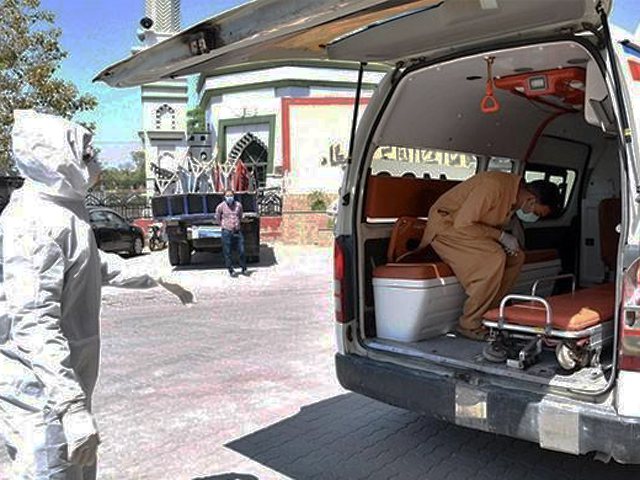
KARACHI :
Pakistani health experts fear a steep rise in already raging coronavirus cases in the country in days to come following easing of lockdown restrictions, with crowds of people pouring into markets.
Footage aired on local broadcasters on Thursday showed many markets, and shopping areas in the capital Islamabad, commercial capital Karachi, Lahore, Peshawar, Quetta, and other cities, packed with shoppers, who hardly bothered to follow precautions.
Many shopkeepers, and their shoppers, including women carrying small kids, were not even wearing face masks.
Pakistan on Monday further relaxed coronavirus restrictions to open small markets and shops across the country despite a sharp rise in cases. The country has so far confirmed more than 35,700 cases with 770 deaths related to Covid-19
“What I have seen in the past two days, worries me a lot. Citizens have bulldozed all the precautions,” said Dr. Seemi Jamali, the head of Jinnah Postgraduate Medical Center in Karachi, one of the country’s largest health facilities.
“If this continues unchecked, I am afraid we will be heading towards the herd immunity in days to come,” Jamali told Anadolu Agency.
“We are already getting more serious patients than before. It would go even worse, and we would lose more precious lives in case of the herd immunity,” she warned.
Dr. Qaisar Sajjad, the secretary general of Pakistan Medical Association — a nationwide body of medical professionals — endorsed Jamali’s views expecting a sharp rise in number of Covid-19 cases after a couple of weeks.
“I do not want to say, but the current scenario would lead us to the herd immunity,” Sajjad told Anadolu Agency.
“Rise in Covid-19 cases means more number of severe patients who would require ventilators and intensive care facilities, which we unfortunately do not have,” he added.
Naazish Roshan Lakhani, an infection control coordinator at Dow University of Health Sciences Hospital Karachi, said “Citizens are not cooperating with us. They are not following the precautions. They have no idea how much our health system is overburdened due to this pandemic,” Lakhani told Anadolu Agency, citing the crowds of shoppers at markets.
“I appeal to them [citizens] to follow precautions, mainly social distancing, and reduce the burden from us,” she said warning that hospitals are already running out of beds.
Lockdown might be reimposed
Acknowledging that the people across the country were not following the government’s guidelines, Federal Minister for Planning Asad Umar on Tuesday warned the restrictions could be reimposed if precautions were not adhered.
“This is unfortunate to see that people are not following the safety guidelines. Easing lockdown does not mean the coronavirus is over,” Umar, who also heads the country’s battle against Covid-19, said while addressing the volunteers of Tiger Force, a recently formed anti-coronavirus organization in Islamabad.
“If the citizens continue to violate the safety precautions, the lockdown can be reimposed,” he warned.
Authorities on Wednesday sealed several big markets in Karachi and Lahore that failed to follow safety precautions.
The federal and provincial governments have announced to take “stern” action against shopkeepers, and traders who do not follow the safety guidelines.
The government of southern Sindh province, hardest hit by the pandemic, has raised the fine amount from 3,000 to 1 million Pakistani rupees (from $18.6 to $6,204) for violation of safety guidelines.
Doctors in all four provinces have already issued separate calls for a stricter and longer nationwide shutdown, fearing that the country’s already fragile health system will collapse if the number of cases continues to grow at the current pace.
Naeem Mir, the secretary general of All Pakistan Traders Alliance, for his part, said the traders were “trying best” to implement the government’s guidelines.
“It will take a few more days because neither shopkeepers nor shoppers are used to such precautions,” Mir told reporters in Lahore.
Traders, he said, would never want the lockdown to be reimposed.
“This is true that we cannot lock the people forever. But, the communities have to learn to live with this new way of life,” Dr. Jamali observed.
“Vaccinations are unlikely to come before a year or two. Until then, we have no other choice but to follow this new way of life with strict precautions,” she stressed.
Dr. Sajjad agreed, saying: “Prevention is the only cure for this virulent pandemic at the moment”.
Since appearing in China last December, the novel coronavirus has spread to at least 188 countries and regions, with its epicenter having shifted to Europe and the US.
The pandemic has killed nearly 300,000 people, with total infections surpassing 4.35 million, while more than 1.55 million people have recovered from the disease, according to figures compiled by the Johns Hopkins University.



0 Comments